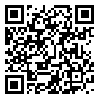BibTeX | RIS | EndNote | Medlars | ProCite | Reference Manager | RefWorks
Send citation to:
URL: http://jhr.ssu.ac.ir/article-1-341-en.html
2- Department of Information Technology, Faculty of Industrial Engineering, K. N. Toosi University of Technology, Tehran, Iran
Introduction: In order to simplify the information exchange within the medical diagnosis process, a collaborative software agent’s framework is presented. The purpose of the framework is to allow the automated information exchange between different medicine specialists.
Methods: This study presented architecture of a hybrid disease diagnosis system. The architecture employed a learning algorithm and used soft computing to build a medical knowledge base. These machine intelligences are combined in a complementary approach to overcome the weakness of each other. To evaluate the hybrid learning algorithm and compare it with other methods, 699 samples were used in each experiment, where 60% was for training, 20% was for cross validation, and 20% for testing.
Results: The results were obtained from the experiments on the breast cancer dataset. Different methods of soft computing system were merged to create diagnostic software functionality. As it is shown in the structure, the system has the ability to learn and collect knowledge that can be used in the detection of new images. Currently, the system is at the design stage. The system is to evaluate the performance of hybrid learning algorithm. The preliminary results showed a better performance of this system than other methods. However, the results can be tested with hybrid system on larger data sets to improve hybrid learning algorithm.
Conclusion: The purpose of this paper was to simplify the diagnosis process of a patient by splitting the medical domain concepts (e.g., causes, effects, symptoms, tests) in human body systems (e.g., respiratory, cardiovascular), though maintaining the holistic perspective through the links between common concepts.
Received: 2016/11/8 | Accepted: 2017/03/4 | Published: 2017/03/7
| Rights and permissions | |
 |
This work is licensed under a Creative Commons Attribution 4.0 International License. |





